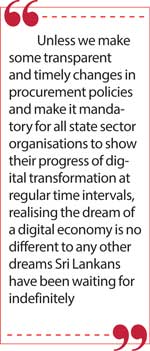Saturday Feb 07, 2026
Saturday Feb 07, 2026
Thursday, 10 April 2025 00:30 - - {{hitsCtrl.values.hits}}

Digital transformation is a journey
 Digital transformation of a country or an organisation should necessarily be considered as a journey and not a destination. Evolving technologies, ever changing customer needs and new legislations demand changes even in best-in-class systems. We have been discussing about digitalisation for decades with poor results compared to many other countries in the region. The new Government is showing a keen interest in transforming the economy to a digital economy for which digital transformation of economic entities is essential. Despite the enthusiasm of the leadership, voluntary efforts of the subject matter experts from industry, new entities being created, and various top-level discussions in media, seeing the results will take more time than assumed. This article attempts to highlight a few policy level and operational level demands in our journey of becoming a digital economy.
Digital transformation of a country or an organisation should necessarily be considered as a journey and not a destination. Evolving technologies, ever changing customer needs and new legislations demand changes even in best-in-class systems. We have been discussing about digitalisation for decades with poor results compared to many other countries in the region. The new Government is showing a keen interest in transforming the economy to a digital economy for which digital transformation of economic entities is essential. Despite the enthusiasm of the leadership, voluntary efforts of the subject matter experts from industry, new entities being created, and various top-level discussions in media, seeing the results will take more time than assumed. This article attempts to highlight a few policy level and operational level demands in our journey of becoming a digital economy.
Chronic problem of technology adoption
What works in Sri Lanka is forced adoption. Will you agree? Fuel QR code is the best example. It was ‘either you adopt it or no fuel for you’ situation and citizens adopted the solution in no time. Is it the same with other digital initiatives? Not at all. I would share two examples here.
Internet banking was introduced in Sri Lanka by the most tech savvy bank during that era even before the other countries in the region. However, adoption was very low for decades. Similarly, many award-winning digital banking channels introduced by banks in collaboration with innovative fintech firms were not adopted by customers as anticipated. Before the pandemic the usage of innovative digital channels was less than 10% of total transaction volumes as per CBSL reports. It was the pandemic which pushed Sri Lankans to use digital banking channels better.
Another story to examine is the e-revenue license solution introduced by the Western Provincial Council in collaboration with ICTA about a decade ago. This product won the gold award as Sri Lanka’s best e-government solution at the National Best Quality Software Awards, and they also won a merit award at the Asia Pacific ICT Awards in the same year. The usage of this solution was very low even though over 40% of the vehicles are registered in western province and both connectivity and IT literacy are high in this province. What does it show? People prefer to go to the divisional secretariat physically and wait in a queue for hours until their turn to get the vehicle revenue license renewed. Supply side innovations are not so attractive to the demand side. The message to policy authorities is straight forward. Unless we make the digital services user friendly, useful and attractive in terms of incentives digitalisation investments will not give the country the expected returns.
Adding value to key sectors
Digital transformation of the economy should necessarily focus on priority industry sectors that can boost the economic growth. What can we do immediately? There are many digitalisation initiatives we can implement to add value to stakeholders. Here is one example out of many we can think of. How fast one can make a complaint to police emergency number 119? A higher probability exists to win a lottery than getting connected with them in the first few attempts. Can 119 go digital? This can completely change the perception of tourists about the country and certainly will have an impact on pricing. Sense of security is a key concern even in selecting a travel destination.
Easy accessibility, automated complaint registration, instant follow up, escalation of non-attended complaints to higher authorities, traceability, assurance to deploy police within a few minutes, and the ability to communicate in multiple languages are some facilities we can offer through this. There is no auspicious time to begin this change. There are dozens of time-tested local developers who can implement this within weeks. This can also be a very appealing CSR project for an insurance company. Aggressive leadership can make this happen even in the next month.
Depicting existence
 At the recent 25th anniversary celebration speech, the founder and the Vice Chancellor of SLIIT, Professor Lalith Gamage said that the key objective at the time of setting up the university was to make education accessible, available and affordable to everyone. He described this as the essential 3As. Prof. Gamage also highlighted how digital technologies have been used in achieving this. Shouldn’t this be the objective of any organisation offering various services to citizens? DigitaliSation of the country using appropriate technologies should necessarily make the government services accessible, available and affordable to everyone. Depicting the need of existence can compel many state entities to go digital.
At the recent 25th anniversary celebration speech, the founder and the Vice Chancellor of SLIIT, Professor Lalith Gamage said that the key objective at the time of setting up the university was to make education accessible, available and affordable to everyone. He described this as the essential 3As. Prof. Gamage also highlighted how digital technologies have been used in achieving this. Shouldn’t this be the objective of any organisation offering various services to citizens? DigitaliSation of the country using appropriate technologies should necessarily make the government services accessible, available and affordable to everyone. Depicting the need of existence can compel many state entities to go digital.
I remember seeing a very good digital solution developed by a team of staff members of the elections department in a national competition in the recent years. It shows their willingness and readiness to go digital. In a country with over 125,000 IT professionals and an estimated number of over 500 IT firms of different sizes, why cannot we develop a local system to conduct electronic voting? Imagine the billions of rupees we can save through one such initiative.
We are one of the few countries in the world allocating the lowest budget for education as a percentage of the GDP. I recall an award-winning solution developed by the internal staff of a regional education department. What makes us not to implement such systems across the country while recognising and rewarding the developers? The “Mankiwwa” app introduced by an award winning local social entrepreneur, or any similar mobile app would have been implemented by all the local authorities by now to receive, retrieve and respond to public complaints efficiently. Has it happened? I know more than hundreds of attempts this entrepreneur makes every year!
Differentials in the wrong way
How many of us argue with shopkeepers when they say card payments are charged 3% more prompting us to pay in cash. With such stupidity embedded in the system with no corrective actions by regulators, expecting a digital transformation will continue to be a dream or only a political promise. Merchants should ideally add 3% for cash transactions or else those who pay digitally should be given a discount as an incentive.
I remember listening to the CTO of Copenhagen city council long time ago in a national IT conference. He mentioned how over 40 citizen services such as issuance of birth, marriage and death certificates to tax payments had been made available through digital channels successfully. A member from the audience asked the question many of the readers may also think about. How did they make it popular and appealing to use digital services instead physical visits? The answer was simple. They had made available online services without any service fee whereas those who opted to visit physically had to pay a service charge. What do we do?
Getting exposed with digital?
We also need to understand the fact that there is resistance towards digitalisation as it improves monitoring and transparency. Unless there is a pulling effect from the demand side breaking this barrier will be a daunting task. The citizens should embrace the new technologies and demand more and more services to be digitalised. Shouldn’t a citizen seeking justice be given the decision within a predefined time? Digitalisation demands reengineered processes and new key performance indicators for state organisations.
Authorities should take adequate steps to address why employees resist change. Fear of failure, preference to continue with the current status quo, and uncertainties are among the reasons in the common list. Textbook list contains organisational inertia, lack of dynamic capabilities and absorptive capacity, path dependence, ambidexterity and core rigidities as reasons.
New business models
It is quite evident that the traditional procurement methods adopted by the governments will not work in expediting digital transformation. New strategies and business models are essential. This requires innovative thinking and flexibility from both the supply and demand sides of the equation. Will a government entity accept an offer from a local vendor to digitalise a particular area of the institution free of charge? I recall a case during the early phase of the pandemic. A free offer from a local ERP firm to manage the vaccination process was ignored by top authorities allowing international television channels to show how Sri Lankans were waiting in long queues. Interestingly, this local ERP firm owned by an award-winning tech entrepreneur had implemented healthcare solutions in regional markets as UN supported projects.
Any new high-tech product has the state backing as a ready buyer in most of the developed countries. US Defence is known for supporting new ventures with their high-tech innovations by becoming the first buyer so that the new players have a globally known user to show in reaching other potential clients. How does it happen in Sri Lanka? Local vendors will either be ignored or in some cases intentionally disqualified by bringing various clauses to procurement guidelines. This bitter truth is equally observed in the private sector.
Need for new social indicators
Western business firms announce their carbon footprints and even water footprints to gain more attention from the buyers. Implementing such practices locally is good. However, we need to think of innovative KPIs to be shown to the public by large business firms. Do we know which Sri Lankan bank is mostly using locally developed software? Being entities recording massive profits every year irrespective of the economic conditions or performance of other sectors, how ethical it is for banks to ignore the use of domestically developed technologies?
I recall a speech made by Dr. Nayana Dehigama, Founder Chairman of Epic Lanka at a national conference way back in 2007. He highlighted the need to set off irrational, irresponsible and non-patriotic foreign procurements with sweat and blood of thousands of Sri Lankan migrant workers who are remitting their hard earnings. Now after 18 years, do we see any change in the mindset of corporate or state entities in procurement processes?
Digitalisation of Sri Lankan economy should happen mostly with locally developed solutions in a decentralised manner. This may not be applicable to major national initiatives such as issuance of identity cards, driving licenses etc. where scalability, interoperability and conformance needs become priorities. However, patriotic leadership can empower the domestic vendors to handle any mission critical digital transformation initiatives much better than the global brands eating into our forex reserves.
Key takeaways
Digital transformation is a journey. Incremental improvements to change the rigid and inefficient systems are also mandatory to make this happen. It is true that some national level digital initiatives are time consuming and require substantial prior studies and investments. However, such projects should not be obstacles in the digital transformation. Instead waiting for the big bang, leaders of state organisations and corporate firms should examine what they can immediately do to march towards digitalisation of the economy. In doing so, it is essential to deviate from the rigid and outdated procedures and adopt new strategies and business models. Unless we make some transparent and timely changes in procurement policies and make it mandatory for all state sector organisations to show their progress of digital transformation at regular time intervals, realising the dream of a digital economy is no different to any other dreams Sri Lankans have been waiting for indefinitely.
(The writer is a past president of the Software Chapter of the Federation of IT Industry of Sri Lanka and a past exco member of the Computer Society of Sri Lanka. He has been a member of the judging panels of national and international IT competitions for over 15 years. He is a fellow of the British Computer Society, the Chartered Institute for IT and holds memberships in 8 other professional institutions in mechanical engineering, computing, engineering and technology, innovation management, marketing, psychology, and logistics. He is an ex-banker with four decades of experience in diverse industry sectors. Currently, he is a senior academic fellow attached to SLIIT Business School. Email: [email protected].)